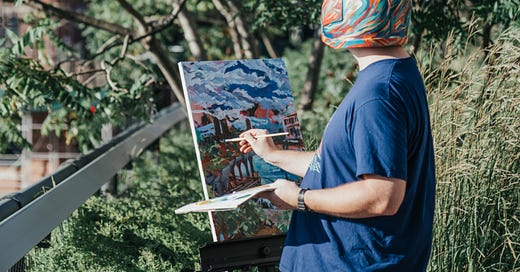The more I delve into the world of Web3, the more I firmly believe this new Web presents an opportunity to change our cultural narrative around “starving artists” (and starving creators) (and podcasters).
So many people “wished me the best” when I was 20 and had dreams of becoming an artist. (At 16 I wanted to be a comedian, at 20 a rock-star…) A quarter of a century later, things haven’t changed much. When I say I run a podcast, most people see it as a dilettante job that I do just for fun. They almost immediately ask me what my other “real job” is. But I don’t consider my podcast as a hobby or a labor of love. It’s something I take seriously. Between preparing my topics, inviting the right guests, recording my show, distribution and promotion, I spend almost 12 hours a week on my show. Even so, when I tell people “I have a podcast,” I still feel some people smiling politely. At worst, I can feel they’re embarrassed for me.
I think this lack of social recognition is a big part of why there are not more creators today. Not being taken seriously acts as a talent inhibitor and it’s time to get rid of that. Especially when we are on the precipice of an unprecedented renaissance in art and creativity.
The main reason for this renaissance is we have better tools of self-expression, and those tools have become cheap and ubiquitous. This is especially true for podcasting. Anchor, for example, gives you everything you need right from your phone to create a podcast, from recording to editing to distributing your content. It unleashes a culture of creativity by removing traditional barriers. It used to take a ton of money and a team of several people to create audio content. Now, we’re in a world where the girl next door can create a podcast right from her closet and reach the top of the charts.
The second reason for this renaissance is distribution. Society has reached an unprecedented level of connection. Yes, social media is full of shit. But it also allows us to distribute our work and build communities around it.
Still, if we’re going to unleash the true creative potential of humanity, we need one more thing: a sustainable and fair business model. Traditional platforms have indeed liberated our creative power, but they’ve taken all the economic value artists created along with it. This is unacceptable. But until we are able to provide a new economic infrastructure that redistributes that value, millions of creators, including many potential podcasters, will decide not to go full time. They’ll still be too worried about being able to put food on the table, or simply too worried about what others will think.
I firmly believe that crypto and NFTs are our best bet for creating the new financial infrastructure that creators and podcasters desperately need today. Not the traditional forms of monetization like sponsorship, advertising or subscriptions proposed by the traditional platforms—or even the new platforms who claim to be pro-creator. Of course—and this is always the case when something new comes along—there will be extreme volatility in the beginning. The majority of Web3 projects will not endure or even trickle out, but the core technology is here to stay. (The fact that Stripe recently decided to incorporate crypto is actually a strong signal).
We’re going to see more and more projects appear that will allow creators to invent new incentives for both themselves and their fans. I can’t help but think about podcasters, and I want us to be the ones who allow them to reimagine their connection to both their content and their audience.
Here’s the thing: a podcast is more than just content. It’s a community of passionate, like-minded people with whom you share moments. These moments are important, rare, and sometimes iconic. I want Uncut to allow podcasters to celebrate these unique moments with their audience and turn them into memorable, shareable assets that listeners can eventually own.
I know what most of you are thinking. Who the hell would want to own a piece of my podcast? Well, I would! Not because I think your content is going to be worth millions (although I would be very happy if that’s the case) but because you mean something to me and I want my personal story to be connected to yours. I’d love to own that one moment when Judd was raving about polar bears who refuse to wear pants or Jesi telling her audience how she broke her tooth eating popcorn.
The moment you create a community around your content, you see people desperately trying to become part of it and making it their own. Your content becomes an artifact, a symbol and a rallying sign for them to claim. Some do it just to show their true appreciation, others for the sake of collecting, and yes, a few do it because they believe your content will be even more valuable the day you become famous. Social media helped us understand this need for validation and belonging. The “Like” button was a precursor to this new world, but the appreciation it provides is too ephemeral and offers nothing in return to those who use them.
It’s time to create something that actually allows us to share in the wealth together.




